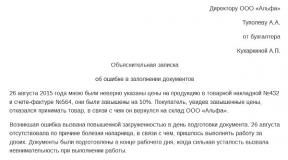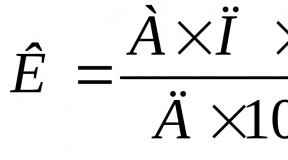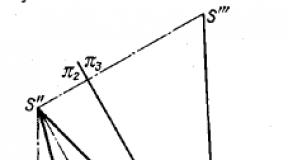Refusal of an employee to undergo a periodic medical examination. Question: An employee refused to undergo a periodic mandatory medical examination on his day off. Does an employer have the right to remove an employee from work? Is the employer required to
Employees engaged in work with harmful and (or) dangerous working conditions (including underground work), as well as in work related to the movement of vehicles, undergo mandatory preliminary (upon employment) and periodic (for persons under the age of 21 years - annual) medical examinations to determine the suitability of these workers for the performance of assigned work and warning occupational diseases. In accordance with medical advice these employees undergo extraordinary medical examinations, as indicated by Article 213 of the Labor Code Russian Federation(hereinafter - the Labor Code of the Russian Federation).
List of harmful and (or) dangerous production factors, during the implementation of which preliminary and periodic medical examinations (examinations) are carried out, approved by Order of the Ministry of Health and Social Development of the Russian Federation dated April 12, 2011 No. examinations (examinations), and the Procedure for conducting mandatory preliminary and periodic medical examinations (examinations) of workers engaged in hard work and work with harmful and (or) dangerous working conditions "(hereinafter - Procedure No. 302n).
Order No. 302n establishes the rules for conducting mandatory preliminary (when applying for a job) and periodic medical examinations (examinations) of persons employed in hard work and work with harmful and (or) dangerous working conditions (including underground work), at work associated with the movement of transport, as well as at work, during the performance of which it is mandatory to conduct preliminary and periodic medical examinations (surveys) in order to protect public health, prevent the occurrence and spread of diseases.
Mandatory preliminary medical examinations (examinations) upon admission to work are carried out in order to determine whether the state of health of a person entering a job is in line with the work assigned to him, as well as for the purpose of early detection and prevention of diseases.
Mandatory periodic medical examinations (examinations) on the basis of clause 3 of Procedure No. 302n are carried out in order to:
- dynamic monitoring of the health status of workers, timely detection of diseases, initial forms of occupational diseases, early signs of the impact of harmful and (or) dangerous production factors on the health of workers, the formation of risk groups for the development of occupational diseases;
– detection of diseases, conditions that are medical contraindications for continuing work associated with exposure to harmful and (or) dangerous production factors, as well as work that requires preliminary and periodic medical examinations (examinations) of employees in order to protect public health, prevent the emergence and spread of diseases;
– timely implementation of preventive and rehabilitation measures aimed at maintaining the health and restoring the working capacity of employees;
- prevention of accidents at work.
Preliminary and periodic examinations are carried out by medical organizations of any form of ownership that have the right to conduct preliminary and periodic examinations, as well as to examine professional suitability in accordance with the current regulatory legal acts.
To conduct a preliminary or periodic examination by a medical organization, a permanent medical commission is formed.
Responsibility for the quality of preliminary and periodic examinations of employees rests with the medical organization.
Preliminary examinations are carried out upon admission to work on the basis of a referral for a medical examination issued to the person applying for work by the employer.
For a person undergoing a preliminary examination, a medical organization issues:
– outpatient medical card;
- an employee's health passport (if it has not been issued earlier).
Upon completion of the preliminary examination by a person entering work, a medical organization draws up a conclusion based on the results of a preliminary (periodic) medical examination.
The conclusion is drawn up in two copies, one of which, based on the results of the medical examination, immediately after the completion of the examination, is issued to the person entering the job, or who has completed the periodic medical examination, in his hands, and the second is attached to the medical record of the outpatient.
The frequency of periodic inspections is determined by the types of harmful and (or) dangerous production factors affecting the employee, or the types of work performed.
In accordance with paragraph 19 of Procedure No. 302n, periodic inspections are carried out on the basis of lists of names developed on the basis of contingents of workers subject to periodic and (or) preliminary inspections, indicating harmful (dangerous) production factors, as well as the type of work. Name lists are sent by the employer to the specified medical organization no later than 2 months before the start date of the periodic examination agreed with the medical organization.
The medical organization, within 10 days from the date of receipt of the list of names from the employer (but not later than 14 days before the start date of the periodic examination agreed with the employer), on the basis of the specified list of names, draws up a calendar plan for the periodic examination.
The calendar plan is coordinated by the medical organization with the employer (his representative) and approved by the head of the medical organization.
Not later than 10 days before the start date of the periodic examination agreed with the medical organization, the employer is obliged to familiarize the employees subject to periodic examination with calendar plan(clause 26 of Order No. 302n).
The medical commission of a medical organization, on the basis of the hazardous production factors or work indicated in the list of names, determines the need for participation in preliminary and periodic examinations of the relevant specialist doctors, as well as the types and volumes of necessary laboratory and functional studies.
To undergo a periodic examination, the employee is obliged to arrive at the medical organization on the day established by the calendar plan and present the relevant documents to the medical organization.
Periodic examination is completed in the case of an examination of the employee by all medical specialists, as well as the completion of a full range of laboratory and functional studies.
Data on the passage of medical examinations by virtue of clause 33 of Order No. 302n are subject to entry into personal medical books and accounting by medical and preventive organizations of the state and municipal health care systems, as well as by bodies exercising federal state sanitary and epidemiological supervision.
According to paragraph 48 of Procedure No. 302n, employees (persons entering work) are not allowed to perform work with harmful and (or) dangerous working conditions, as well as work that requires preliminary and periodic medical examinations (examinations) in order to protect health population, preventing the occurrence and spread of diseases, in the presence of relevant general medical contraindications.
State supervision (control) over compliance with the procedure for conducting medical examinations is carried out by the federal executive body exercising the functions of supervision and control over compliance with sanitary and epidemiological control and its territorial bodies.
In accordance with part 6 of article 213 of the Labor Code of the Russian Federation, employees engaged in certain types of activities, including those associated with sources of increased danger (with the influence harmful substances and adverse production factors), as well as those working in conditions of increased danger, undergo a mandatory psychiatric examination at least once every five years in the manner established by the federal executive body authorized by the Government of the Russian Federation.
The procedure for conducting a mandatory psychiatric examination by employees engaged in certain types of activities, including activities associated with sources of increased danger (with the influence of harmful substances and adverse production factors), as well as those working in conditions of increased danger, is determined by the Decree of the Government of the Russian Federation of September 23, 2002 year No. 695 (hereinafter - Regulations No. 695).
Recall that the list of medical psychiatric contraindications for the implementation of certain types of work and activities associated with a source of increased danger was approved by the Decree of the Government of the Russian Federation dated April 28, 1993 No. 377 "On the implementation of the Law of the Russian Federation "On psychiatric care and guarantees of the rights of citizens in its provision ".
Mandatory psychiatric examination of an employee in accordance with paragraph 2 of Regulation No. 695 is carried out on a voluntary basis, taking into account the norms established by the Law of the Russian Federation of July 2, 1992 No. 3185-1 "On psychiatric care and guarantees of the rights of citizens in its provision."
As follows from the provisions of Article 76 of the Labor Code of the Russian Federation, the employer is obliged to remove from work (not allow to work) an employee who has not undergone a mandatory medical examination in the prescribed manner, as well as a mandatory psychiatric examination, in cases provided for by the Labor Code of the Russian Federation, other federal laws and other regulatory legal acts of the Russian Federation;
See also paragraph 4 of article 34 of the Federal Law of March 30, 1999 No. 52-FZ "On the sanitary and epidemiological well-being of the population".
The employee is suspended from work until the medical examination is completed. During this period, he is not paid. The refusal of an employee to undergo a medical examination is a reason for the employer to fire him. In this case, the employment contract may be terminated by the employer if the employee already has a disciplinary sanction (reprimand or reprimand for committing a disciplinary offense - non-performance or improper performance by the employee through his fault of the labor duties assigned to him) (paragraph 5 of part 1 of article 81 of the Labor Code of the Russian Federation).
If an employee has not passed a medical examination through no fault of his own, he is also suspended from work, but this time is paid as downtime. Thus, according to Article 157 of the Labor Code of the Russian Federation, the period of suspension from work for reasons beyond the control of the employer and employee is paid in the amount of at least 2/3 of the tariff rate, salary (official salary), calculated in proportion to the downtime. If the employer is to blame for the failure of the employee to undergo a medical examination, the time of suspension from work is paid in the amount of at least 2/3 of the average wages worker.
The employer must arrange for mandatory medical examinations for certain categories of employees (paragraph 12, part 2, article 212 of the Labor Code of the Russian Federation). In turn, employees are required to undergo such inspections (paragraph 6 of article 214 of the Labor Code of the Russian Federation).
If the employee has not passed a medical examination, then the employer removes him from work (does not allow him to work) (Article 76 of the Labor Code of the Russian Federation).
- What documents need to be issued to remove an employee from work if he has not passed the mandatory medical examination?
The Labor Code of the Russian Federation does not define a list of documents that an employer must draw up in order to remove an employee from work.
However, according to the meaning of Art. 76 of the Labor Code of the Russian Federation, it is enough for an employer:
- issue it yourself or receive a document confirming that the employee has not passed a medical examination. For more details, see clause 1.1 of this material;
- issue an order (instruction) on suspension from work. For more details, see clause 1.2 of this material.
1.1. A document confirming that the employee has not passed the mandatory medical examination
Documents that confirm the fact that the employee did not pass the mandatory medical examination may be:
– an explanatory note of the employee about the failure to pass the inspection;
– a written refusal of the employee to undergo an inspection;
- certificate of incapacity for work issued during the inspection;
- documented information medical institution about the absence of the employee for inspection;
- an act on the employee's refusal to undergo a medical examination drawn up by the employer.
For example, considering the dispute over the legality of the removal of an employee from work, the court studied the documents that served as the basis for issuing the relevant order. These included an act on the employee's refusal to undergo a medical examination and a message from a medical institution about the employee's failure to appear for examination.
Based on the evidence presented by the employer, the court found that the order to remove the employee from work was lawfully issued (Decision of the Moscow City Court dated 12/20/2011 in case No. 33-39156).
1.2. Order to dismiss an employee who has not passed a mandatory medical examination
The suspension of an employee from work in connection with the failure to pass a medical examination is issued by order. Its form has not been established, so the employer has the right to develop it independently.
The order should include:
- grounds for removal, which is provided for by federal law or other regulatory legal act (part 1 of article 76 of the Labor Code of the Russian Federation);
- suspension period. It is advisable to determine the end of the suspension not by a specific date, but by an event - the passage of a medical examination. This will avoid issuing additional orders if the employee does not re-pass the medical examination on time;
- circumstances indicating the presence or absence of the employee's fault in not passing the medical examination. They affect the terms of payment (non-payment) of the suspension period;
– terms of payment during the period of suspension;
- a list of documents that confirm the failure to pass a medical examination.
The employee must be familiarized with the order against signature. In case of refusal to sign, the employer should draw up an appropriate act.
If the employee did not pass the mandatory medical examination due to his own fault, then the employer may apply a disciplinary sanction to him (paragraph “c”, paragraph 35 of the Resolution of the Plenum of the Supreme Court of the Russian Federation dated March 17, 2004 N 2).
- Registration of a time sheet upon dismissal of an employee who has not passed a mandatory medical examination
In the time sheet (unified form N T-12 or N T-13), it is necessary to record the period actually worked by the employee until the issuance of the order to remove him. The time of suspension is noted in the report card by putting down an alphabetic (NB) or digital (35) code (suspension from work (non-admission to work) for reasons provided for by law).
- Registration of a work book upon dismissal of an employee who has not passed a mandatory medical examination
An entry on suspension from work due to failure to pass a mandatory medical examination is not entered in the employee's work book. The indication of such information is not provided for by Decree of the Government of the Russian Federation of April 16, 2003 N 225 and Decree of the Ministry of Labor of the Russian Federation of October 10, 2003 N 69.
- Registration of a personal card in case of dismissal of an employee who has not passed a mandatory medical examination
It is not necessary to enter information on the suspension of an employee from work in his personal card (form N T-2), since this is not expressly provided for by Decree of the State Statistics Committee of the Russian Federation of 01/05/2004 N 1.
- Payment for the time of suspension of an employee who has not passed a mandatory medical examination
By general rule wages for the period of suspension from work (non-admission to work) are not accrued. However, federal laws may provide for exceptions (part 3 of article 76 of the Labor Code of the Russian Federation).
For example, the period of suspension from work is paid as a simple one (parts 1, 2 of article 157 of the Labor Code of the Russian Federation) if the employee did not pass the mandatory medical examination through no fault of his own.
- Registration of an order for admission to work after passing a mandatory medical examination
An employee is allowed to work after passing a mandatory medical examination (part 2 of article 76 of the Labor Code of the Russian Federation).
Passing the examination is confirmed by a conclusion issued by a medical organization (clause 31 of the Procedure for conducting mandatory preliminary (when applying for a job) and periodic medical examinations (examinations) of workers engaged in hard work and work with harmful and (or) dangerous working conditions, approved Order of the Ministry of Health and Social Development of Russia dated April 12, 2011 N 302n).
It is better to issue an admission to work by order, since in this case the organization will have a document fixing the end of the suspension period.
Since the unified form of such an order has not been approved, the employer can develop it independently. It is advisable to include the following information in the order:
- surname, name, patronymic of the employee, his position;
- the date from which the employee must start work;
- reason for dismissal;
– an instruction to the accounting department to resume payroll in accordance with employment contract;
- details of the medical report.
In order to avoid further disputes regarding the start date of work (and, accordingly, the question of whether absence from work is absenteeism), the employee must be familiarized with the order against signature. In case of refusal to sign, an appropriate act is drawn up.
- Registration of a work book when an employee is admitted to work after passing a mandatory medical examination
The legislation does not provide for making an entry in the work book about the end of the period of suspension and admission to work (Decree of the Government of the Russian Federation of 16.04.2003 N 225, Resolution of the Ministry of Labor of Russia of 10.10.2003 N 69).
- Registration of a personal card when an employee is admitted to work after passing a mandatory medical examination
It is not necessary to make a record of the end of the suspension period and admission to work on a personal card (form N T-2), since this is not expressly provided for by Decree of the State Statistics Committee of the Russian Federation of 01/05/2004 N 1.
However, the employer will need such information when calculating the length of service that gives the right to annual paid leave.
For more information, see “Human Resources Guide. Annual basic paid leave”.
You can record information about the dismissal of an employee (the basis and period of suspension, the presence or absence of the employee’s fault in not undergoing a medical examination) in Section 10 “Additional Information” of Form N T-2.
What should a manager do if an employee refuses to undergo a periodic medical examination centrally, at the expense of the employer, citing low qualifications medical personnel medical institution with which the school has signed an agreement? Moreover, the school employee demands to pay for the medical examination at another medical institution located in another region, taking into account travel. What to do in this case?
Answer
In this case, it is necessary to notify the employee in writing of the need to undergo a medical examination. Passing a medical examination is not a right, but an obligation of an employee. For violation of their duties, the employee may be subject to disciplinary liability. At the same time, the employee is not given the right to choose a medical organization for a mandatory examination. If a school employee refuses a medical examination, he may be suspended from work.
<…>In accordance with the provisions of the Labor Code of the Russian Federation of December 30, 2001 No. 197-FZ (hereinafter referred to as the Labor Code of the Russian Federation), the organization of medical examinations for certain categories of workers is entrusted to the employer. Employees are required to undergo mandatory preliminary (upon employment) and periodic (during labor activity) medical examinations, if this is provided for by the Labor Code of the Russian Federation or other federal laws (Labor Code of the Russian Federation).
Labor legislation does not establish a list of documents that an employer must draw up in order to suspend an employee who has not passed a medical examination *.
Attention:
based on the provisions of Art. 76 of the Labor Code of the Russian Federation, it is enough for the employer to issue it on his own or receive a document confirming that the employee has not passed a medical examination, and issue an order (instruction) to remove the employee from work.
Documents that confirm the fact that an employee of the school did not undergo a medical examination may be:
1) an explanatory note of the employee about the failure to pass the inspection;
2) a written refusal of the employee to undergo an inspection;
3) certificate of incapacity for work issued during the period of the inspection;
4) documented information from a medical institution about the absence of an employee for an examination;
5) an act on the employee's refusal to undergo a medical examination drawn up by the employer.
Suspension of an employee from work in connection with the failure to pass a medical examination is formalized by order (instruction) of the head. The notice of removal must include:
1) Full name and position of the employee;
2) grounds for removal, which is provided for by federal law or other regulatory legal act (Labor Code of the Russian Federation);
3) circumstances indicating the presence or absence of the employee's fault in not passing the medical examination - they affect the terms of payment (non-payment) of the suspension period;
4) payment terms for the suspension period;
5) a list of documents that confirm the failure to undergo a medical examination;
6) the period of suspension.
It is advisable to determine the end of the suspension period not by a specific date, but by an event - the passage of a medical examination. This will avoid issuing additional orders if the employee again does not pass the medical examination on time.
Attention:
if the school employee did not pass the medical examination due to his own fault, the employer may apply a disciplinary sanction to him.
It is not necessary to enter information about the suspension of an employee from work in it, since this is not expressly provided for by law. However, the employer will need such information when calculating the length of service of the employee, giving the right to annual paid leave.
According to the Labor Code of the Russian Federation, an employee is allowed to work after passing a mandatory medical examination. Passing the examination is confirmed by the conclusion issued by the medical institution. Admission to work is also issued by order (instruction) of the head *.<…>
The employer has an obligation to organize medical examinations for a number of categories of workers (part 2 of article 212 of the Labor Code of the Russian Federation). Employees are required to undergo these examinations if they are included in the appropriate list. The basis is article 214 of the Labor Code of the Russian Federation. For example, drivers must pass mandatory inspections. The safety of passengers depends on the results of their examination.
What to do if an employee refuses to be examined
The list of employees who must undergo a mandatory examination is regulated by Article 213 of the Labor Code of the Russian Federation. If an employee who has the appropriate obligations refuses to undergo the procedure, he is suspended from work on the basis of Article 76 of the Labor Code of the Russian Federation.
Suspension is not dismissal. This is the termination of the employee's activities until the moment of inspection. Provides documentation.
Documentary support
The Labor Code does not indicate what papers are needed when removing an employee. From the provisions of Article 76 of the Labor Code of the Russian Federation, we can conclude that it is enough to do these actions:
- Registration of a document that confirms the refusal of the procedure.
- Drawing up an order.
Consider all the nuances of compiling these documents.
Refusal confirmation
These papers can confirm the fact that the specialist did not pass the examination:
- Explanatory note of a specialist.
- Refusal of the employee from the procedure.
- Sick leave, if the specialist was ill during a mandatory event.
- An act of refusal issued by the employer.
Compilation of these documents is mandatory. If an employee goes to court to challenge his suspension, the employer may provide evidence of his decision.
Suspension order
Suspension from work is carried out on the basis of an order. The form of this document is not specified in the law. That is, the company can develop it. The developed form should be reflected in the accounting policy. The order contains this information:
- Name and position of the employee.
- The reason for the suspension (Part 1 of Article 76 of the Labor Code of the Russian Federation).
- Suspension period. The employer is not recommended to indicate the date, as he cannot know when the barrier to work will be removed. It should be stated that the decision on suspension will be withdrawn after the procedure has been completed.
- The presence of the fault of the employee in what happened.
- Payments during suspension.
- List of papers confirming the refusal.
The specialist must be familiarized with the order. If the employee refuses to put his signature, it is necessary to draw up an act of refusal.
NOTE! If the employee is to blame for the failure to complete the procedure, a disciplinary sanction may be applied to him on the basis of paragraph 35 of the Decree of the Plenum of the Supreme Court No. 2 of March 17, 2004.
Written explanation
If the specialist evades the procedure, the employer must ask him explanatory note. The employee is given 2 days to provide explanations. If two days have passed, but the employee has not provided a written explanation, an act of refusal must be drawn up. Its registration is regulated by article 193 of the Labor Code of the Russian Federation.
Time sheet
The time sheet is compiled according to the forms and T-13. The document must reflect the period actually worked out by the specialist before the date of issue of the order. The period of suspension is fixed by means of a code: NB or 35. This code denotes removal from office on legal grounds.
Additional documents
An entry on the suspension of work does not need to be entered in the work book. Such instructions are not contained in Decree No. 225 of April 16, 2003 and Decree of the Ministry of Labor No. 69 of October 10, 2003.
It is also not necessary to make notes in a personal card. There is no indication of this in the Decree of the State Statistics Committee No. 1 of January 5, 2004. However, information about the suspension will be needed when determining the length of service. The latter is required to make a decision on the provision annual leave. Therefore, it is recommended to enter information in section 10 of the personal card. In particular, it is necessary to indicate the reason for the suspension of work, the presence of the employee's fault.
What payments will the suspended employee receive?
The period of non-admission to work does not imply any payments. But there are some exceptions stipulated by part 3 of article 76 of the Labor Code of the Russian Federation. For example, if the employee is not at fault for what happened, the suspension period can be considered downtime. Its payment is regulated by article 157 of the Labor Code of the Russian Federation. Consider the amount of payments during periods of downtime:
- At least 2/3 of average salary if the fault of the employer is present.
- Not less than 2/3 of the salary, if the medical examination does not pass due to circumstances beyond the control of the employer.
What is meant by the absence of guilt? This is an employee’s illness, confirmed by a disability certificate, the employer’s inability to organize a medical examination.
Recovery at work
The suspension period ends when the employee undergoes a medical examination (the basis is part 2 of article 76 of the Labor Code of the Russian Federation). The event must be confirmed. For this, a conclusion is made. It must be issued by a medical institution. Renewal of admission to work is carried out on the basis of an order. Its form has not been established. It must be developed by the company itself.
The order contains the following information:
- Name of the employee and position.
- Reopening date.
- Reason for the suspension.
- Instructing the accounting department to resume payroll.
- Details of the conclusion of the inspection.
The employee must be familiarized with the document against signature. The signature confirms that the employee agrees to be reinstated. This is an acknowledgment of mutual agreement regarding the end date of the suspension.
Information about the restoration is not required to be entered in the work book and personal card. If the information is entered into a personal card, they must be recorded in section 10 of the T-2 form.
Can an employee be fired for refusing an inspection?
If an employee refuses to undergo an inspection that is mandatory for him, he neglects his labor duties. The latter are regulated by article 214 of the Labor Code of the Russian Federation.
If the employee does not have good reasons for refusal, his act may be declared a disciplinary offense. It involves administrative responsibility. However, for such an offense it is impossible to terminate the employment contract. Dismissal can only be carried out if there are already several disciplinary offenses.
Additional Information
There are situations in which an employee's refusal to be examined is perfectly legitimate. In particular, an employer cannot force a worker to undergo a medical examination on a day off. On his day off, the employee is released from work duties, the list of which includes a medical examination.
The removal of a specialist who has not passed the procedure from work is the obligation of the employer, and not his right. it necessary measure security. Consider an example. The driver of a passenger bus refuses a medical examination. There is a possibility that the employee is under the influence of alcohol. That is, his removal is necessary to ensure the safety of passengers. Allowing such an employee to work is an offense.
Professional medical examinations involve an examination of an employee in specialized medical institutions licensed for this type of activity. The medical examination ends with obtaining a conclusion on the state of his health, which serves as an admission to work. That's why this procedure is mandatory, and its nuances are spelled out in articles 212, 213, 214 of the Labor Code of the Russian Federation. In cases of non-compliance with them, there will be no concessions for the culprit.
Obligations and consequences of their non-fulfillment for the employer
The organization of professional examinations and their payment should be carried out exclusively by the employer. This is one of his main responsibilities.
Namely:
- Make a list of employees who should undergo a regular and preliminary examination, and send it to the authorized body of Rospotrebnadzor.
- Choose a medical institution for the implementation of a medical examination, sign an agreement with it, agree on the timing, send the lists of the contingent there.
- 10 days before the appointed date, introduce subordinates into the course of the upcoming procedure and give them a referral.
If a medical examination is to be carried out by one employee, then he can do it at his own expense, and provide all checks for compensation to his direct management.
Failure to comply with this procedure by the employer or refusal to do so is an administrative offense and is punishable by a fine of 500 rubles or more. and higher.
Consequences for the worker
After presenting a referral for a physical examination, the subordinate must appear at the specified time at the clinic with all the necessary documents, where they can be examined by specialists and pass the necessary tests. Based on this, a conclusion of the medical board is drawn up in 4 copies.
If the employee refuses to undergo this inspection, he is not allowed to work, for which an order is written.
Is it possible to refuse a medical examination?
In addition, the management is obliged to impose a disciplinary sanction on him. And if this is repeated, then even dismissal is possible under Article 81, Clause 5, Part 1 of the Labor Code.
Therefore, medical examinations are an integral part of labor discipline, which should be carried out not only for the sake of following instructions, but also for the benefit of one's own health and the health of subordinates.
What sanctions can be applied to an employee and what documents are required for this to be issued if the employee refuses to undergo a medical examination?
Employees, according to Art. 214
Order of the Ministry of Health and Social Development of Russia dated April 12, 2011 N 302n approved the List
Periodic examinations are carried out by medical organizations of any form of ownership that have the right to conduct preliminary and periodic examinations, as well as to examine professional suitability in accordance with the current regulatory legal acts (clause 4
In accordance with Art. 76
The employer issues an order on the suspension of the employee, which indicates the grounds for suspension from work, as well as the period of suspension, while the period is best determined not by a specific date, but by the moment of passing a medical examination.
If the employee refuses to sign the suspension order, a free-form act is drawn up, which records that the employee refused to sign.
In addition, refusal to undergo a medical examination is a violation of labor discipline, in connection with which the employer has the right to apply to such an employee the disciplinary measures established in Art. 192
If an employee avoids undergoing a periodic medical examination, the employer must request a written explanation from the employee with a request to provide an explanation of the reasons for not passing the medical examination within two days, as well as obtain documented information from the medical institution about the employee’s failure to attend the medical examination. If after two working days the employee refuses to give any explanations, then an appropriate act is drawn up (part 1 of article 193
The fact that an employee has committed a disciplinary offense is documented by an order on the application of a disciplinary sanction.
Refusal of medical examination at the enterprise
The order indicates the misconduct committed by the employee, namely the refusal to undergo a medical examination, the circumstances of the misconduct and the type of disciplinary sanction applied. In case of refusal to sign the order, an appropriate act is drawn up (part 6 of article 193
Medical examinations: an employee may be punished for refusing to undergo them
According to Art. 212 of the Labor Code of the Russian Federation, the employer is not entitled to allow employees to perform their labor duties without passing mandatory medical examinations, when their passage is mandatory in accordance with the law.
The purpose of preliminary medical examinations upon entry to work is to determine whether the health status of employees is in line with the work assigned to them and to detect and prevent occupational diseases at an early stage.
In accordance with Art. 69 of the Labor Code of the Russian Federation, persons under the age of 18, as well as other persons in cases provided for by the Labor Code of the Russian Federation and other federal laws, are subject to mandatory preliminary and periodic medical examinations.
Thus, the Labor Code of the Russian Federation establishes the obligation to undergo a preliminary and periodic medical examination also for:
- workers employed in work with harmful and (or) dangerous working conditions (part 1 of article 213 of the Labor Code of the Russian Federation);
- workers employed directly related to traffic Vehicle(part 1 of article 213, article 328 of the Labor Code of the Russian Federation);
- workers employed in underground work (part 1 of article 213, article 330.3 of the Labor Code of the Russian Federation);
- athletes (Article 348.3 of the Labor Code of the Russian Federation);
- persons recruited to work in the regions of the Far North and areas equated to them from other areas (Article 324 of the Labor Code of the Russian Federation);
- employees of organizations Food Industry, Catering and trade, waterworks, medical organizations and children's institutions, as well as some other employers (part 2 of Art.
Refuse medical examination at work. Is it possible to refuse a medical examination?
The obligation of the employer to organize preliminary and periodic medical examinations for specific categories of employees may also follow from other federal laws. Such inspections are mandatory in particular for:
- pedagogical workers (clause 9, part 1, article 48 of the Federal Law of December 29, 2012 N 273-FZ “On Education in the Russian Federation”);
- personnel of facilities for the storage and destruction of chemical weapons (Article 14 of the Federal Law of May 2, 1997 N 76-FZ "On the destruction of chemical weapons");
- certain categories of employees of nuclear facilities (Article 27 of the Federal Law of November 21, 1995 N 170-FZ "On the Use of Atomic Energy");
- persons employed directly related to the movement of trains and shunting work (clause 3, article 25 of the Federal Law of January 10, 2003 N 17-ФЗ “On Railway Transport in the Russian Federation”).
Harmful and (or) dangerous production factors and work, during the performance of which mandatory preliminary and periodic medical examinations are carried out, the procedure for conducting such examinations is determined by the federal executive body authorized by the Government of the Russian Federation.
4 tbsp. 213 of the Labor Code of the Russian Federation).
In accordance with this provision, the order of the Ministry of Health and Social Development of Russia dated April 12, 2011 N 302n approved the lists of harmful and hazardous production factors and work, during which mandatory preliminary and periodic medical examinations are carried out, as well as the procedure for their implementation.
From persons for whom a preliminary medical examination upon employment is not mandatory in accordance with the legislation of the Russian Federation, the employer does not have the right to require such an examination.
Who is required to undergo a psychiatric assessment when applying for a job
Penalty for not passing a medical examination at the enterprise
According to Article 214 of the Labor Code of the Russian Federation, employees of most enterprises are required to undergo medical examinations: both preliminary (before employment) and periodic (during employment). They are joined by other medical examinations, for example, extraordinary in the direction of the employer. An exhaustive list of prerequisites is contained in the Labor Code and other federal laws. If the employer did not organize a medical examination of the staff, the company may be punished.
What is the penalty for failing a medical examination?

New fines for labor protection violations were introduced in 2015. The concept of "labor protection" includes a whole range of activities, including the organization of mandatory medical examinations. In accordance with Part 2 of Article 212 of the Labor Code of the Russian Federation, the employer is obliged to organize their holding for own funds. If this is not done, sanctions are applied to the head of the enterprise, usually a fine for not passing a medical examination at the enterprise. Controllers pay increased attention to these points, since shortcomings in this area are identified quite easily.
The amount of fines has increased significantly, so the organization and timely passing of medical examinations must be given due attention.
Medical examinations: what threatens to refuse them?
So, according to part 3 of article 5.27.1 of the Code of Administrative Offenses of the Russian Federation, punishment in the form of fines from 2015 will be as follows:
- for the leading category of persons - from 15,000 to 25,000 rubles;
- for a guilty company - from 110,000 to 130,000 rubles.
How to organize a medical examination at the enterprise
Control checks for compliance with the requirements of labor legislation are organized by labor inspectors, while the implementation of sanitary and epidemiological legislation is checked by employees of Rospotrebnadzor. It will be difficult to file a claim against a company if its manager plans medical examinations, taking into account the current regulations in this field of activity or relating to a specific category of employees.

The most famous act establishing the procedure and frequency of medical examinations is the order of the Ministry of Health and Social Development of Russia No. 302 n dated April 12, 2011 medical examination of the contingent of the enterprise. Norms on the mandatory medical examinations are also contained in the sanitary rules and the Labor Code of the Russian Federation. Failure to comply with the requirements of any of the regulations threatens the company with administrative liability.
More related articles
Is it possible to refuse a medical examination at work?



















